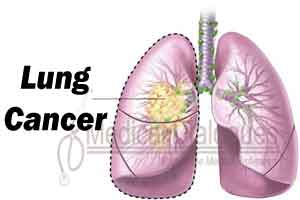- Home
- Editorial
- News
- Practice Guidelines
- Anesthesiology Guidelines
- Cancer Guidelines
- Cardiac Sciences Guidelines
- Critical Care Guidelines
- Dentistry Guidelines
- Dermatology Guidelines
- Diabetes and Endo Guidelines
- Diagnostics Guidelines
- ENT Guidelines
- Featured Practice Guidelines
- Gastroenterology Guidelines
- Geriatrics Guidelines
- Medicine Guidelines
- Nephrology Guidelines
- Neurosciences Guidelines
- Obs and Gynae Guidelines
- Ophthalmology Guidelines
- Orthopaedics Guidelines
- Paediatrics Guidelines
- Psychiatry Guidelines
- Pulmonology Guidelines
- Radiology Guidelines
- Surgery Guidelines
- Urology Guidelines
Alcohol aversion drug found useful in treatment of chemo resistant lung cancer

Scientists have had positive results from a laboratory-based study using a well-known alcohol aversion drug to try to combat chemotherapy resistance in the most common type of lung cancer, non-small cell lung cancer (NSCLC). The findings from the scientists at Trinity College Dublin and St James's Hospital, Dublin, Ireland, have been published in the leading international journal Oncotarget.
Chemotherapy forms the backbone of many treatment plans for lung cancer patients, however, treatment resistance has become a significant clinical challenge. While chemotherapy kills the majority of tumour cells within a tumour, some types of cancer cells, called cancer stem cells, continue to grow and divide and contribute to the development of drug resistance. This results in tumour recurrence or secondary tumours which often prove fatal.
The scientists from the Trinity Translational Medicine Institute at St James's Hospital Dublin, in collaboration with the Cancer Stem Cell Group, Coombe Hospital, Dublin, found that lung cancer cells that have high levels of ALDH activity, a recently identified marker of cancer stem cells became resistant to chemotherapy. This induces the growth and expansion of a drug-resistant population of lung cancer cells, allowing the cancer cells to survive the effects of treatment. These findings may help explain why a large number of lung cancer patients receiving this type of chemotherapy eventually relapse resulting in progression of their disease.
The FDA-approved alcohol aversion drug Disulfiram (Antabuse), which has been used to treat alcohol addiction for over sixty years, works against ALDH by restricting its activity. Upon alcohol consumption, it prevents the body from metabolising alcohol and makes the person feel sick. When it comes to cancer cells, the drug was found to be effective in inhibiting the activity of ALDH, which resulted in decreased tumour cell growth and increased killing of lung cancer stem cells. The research team at Trinity and St James's found that the alcohol aversion drug Disulfiram in combination with chemotherapy, was significantly more effective in killing drug resistant lung cancer stem cells compared to treatment with the chemotherapy alone.
Dr Martin Barr, Adjunct Assistant Professor and a lead investigator in the Thoracic Oncology Research Group, St James's Hospital and Trinity said: "Disulfiram is an already approved drug with well-tolerated side effects which can be taken orally. Its potential use may give chemotherapeutic drugs such as cisplatin, a new lease of life in the treatment of resistant lung tumours. We believe that our research findings show that this is a really important option that warrants further investigation and clinical testing. "
An alternative approach to seeking new drug treatments for cancer is not to start with molecular targets, but to assess those drugs approved for other therapeutic uses which show some evidence of anti-cancer activity. This is the field of drug repurposing in oncology and there is now an increasing interest in the use of non-cancer drugs as anti-cancer therapeutics.
"The development of novel anti-cancer drugs against various malignant tumours is both time-consuming and expensive and involves pre-clinical and clinical testing. Finding new uses for existing drugs, otherwise known as 'repurposing', may allow for new uses of an old drug that may lead to the discovery of new treatments. Such repurposing is a proven shortcut between the research laboratory and the clinic," said Dr Lauren MacDonagh who carried out this study as part of her PhD at Trinity College Dublin.
Lung cancer is the leading cause of cancer-related deaths worldwide and accounts for more deaths than breast, colon and prostate cancers combined. In Ireland, there are more than 2,300 new cases of lung cancer per year and over 1,800 deaths. While incidence rates are decreasing in men, lung cancer incidence is increasing in women.
For more details click on the link: http://dx.doi.org/10.18632/oncotarget.19881

Disclaimer: This site is primarily intended for healthcare professionals. Any content/information on this website does not replace the advice of medical and/or health professionals and should not be construed as medical/diagnostic advice/endorsement or prescription. Use of this site is subject to our terms of use, privacy policy, advertisement policy. © 2020 Minerva Medical Treatment Pvt Ltd